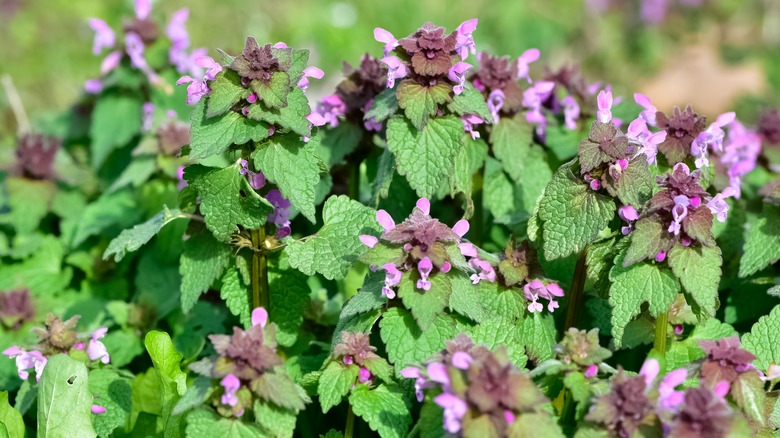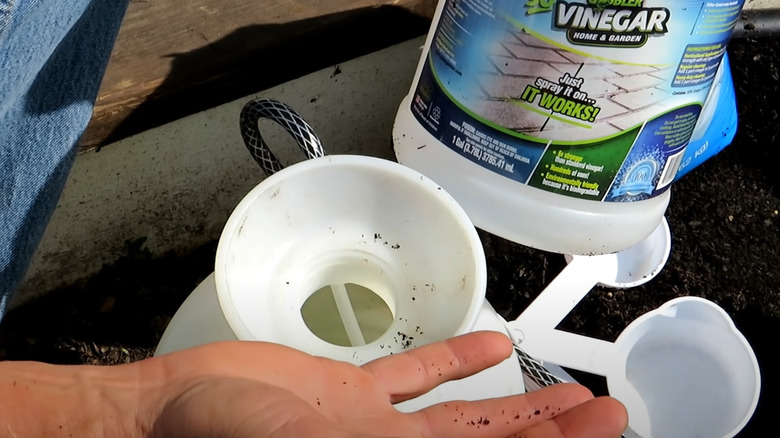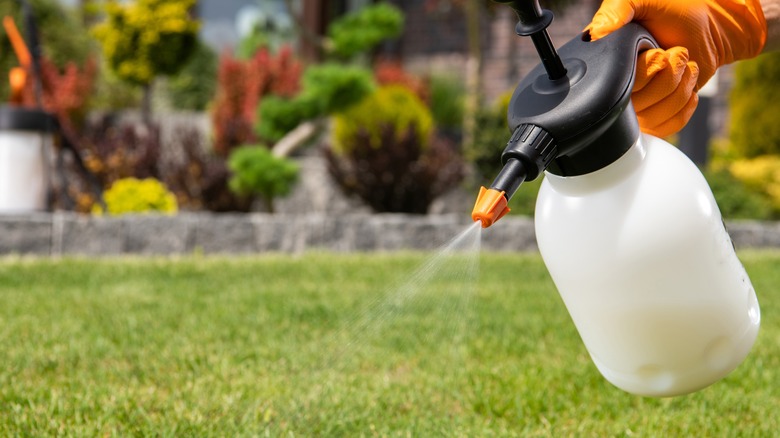Banish Henbit Deadnettle Weeds From Your Lawn With An Ingredient From Your Kitchen
Ah, the pesky Henbit deadnettle! It isn't just an eyesore amidst the greenery of grass. One of the sneaky weeds that'll wreak havoc on your lawn during winter, it's a voracious competitor, engaging in a silent battle for the very lifeblood of your grass — the nutrients, water, and those coveted rays of sunshine. It launches a covert mission, quickly producing and spreading its seeds in spring, aiming to outsmart your grass and claim its riches. The outcome is your lawn looking pretty sorry for itself. But guess what? All's not lost if you act fast. And surprisingly, your saving grace could be a product hiding in plain sight in the most unexpected of places to find a Henbit deadnettle weed killer — your kitchen. That hero is none other than vinegar.
Unleashing vinegar on Henbit deadnettle is like pulling off a botanical magic trick. Here, the star of the show is acetic acid, vinegar's main ingredient and a botanical assassin that penetrates the weed leaves, rupturing plant cells. These cells, once breeched, lose their vital fluids, suffering dehydration so severe that it leads to the weed's eventual death. What's great is that this method of weed control is quick, easy on your wallet, and eco-friendly, which is quite a leap from synthetic chemicals. But remember, it's like performing surgery with a scalpel. You've got to be precise, making sure each spray of vinegar coats those Henbit leaves completely.
How to get rid of Henbit deadnettle in lawn using vinegar
When getting rid of Henbit naturally, you want to skip the regular vinegar you drizzle over your salads. You'll need its tougher sibling — horticultural vinegar, one packing punch with at least 20% acetic acid. For instance, check out Harris 20% Vinegar Weed Killer; you can grab a gallon for about $22 at The Home Depot. And why the gusto for such a high strength? Well, the stronger the acid content, the quicker and more effectively it zaps those weed leaves.
Just splashing vinegar might get some work done, but if you're aiming for maximum stickiness on those stubborn leaves and stems, toss in a bit of surfactant. Think of it as a helper that makes sure the vinegar spray sticks on rather than slips. No store-bought surfactant at hand? A half cup of dish soap per gallon of vinegar will do. Timing is crucial too — target those Henbit weeds while they're young and vulnerable.
But here is the catch: vinegar isn't choosy. It's just as ready to wipe out your petunias as broad-leaf weeds. Spot treating with a backpack sprayer or spray bottle is your best bet. And if your sprayer can shoot a direct stream, that's golden. Give vinegar 24 hours to do its thing, then uproot any scorched weeds. However, don't even think of composting dead mature Henbit weeds. There's the risk of seeds triggering a resurgence. Dispose of the invaders in a trash bag instead.
Caveats for killing Henbit deadnettle in lawn with vinegar
Timing is critical when you're out to kill weeds in your lawn with horticultural vinegar. Picture when you've just doused your weedy foes, only for the heavens to open up — talk about a washout! That's why you've got to pick a scorching day when the rain is nowhere on the horizon. In addition, watch out for the wind. After all, you're not trying to give a vinegar shower to your favorite plants. And how about you take precision a notch higher? Simply grab a disposable paintbrush and give them a dab of vinegar.
However, don't expect the entire weed population to suffer damage after the first round. Those emerging ones might curl up and quit, but the established ones can be tough cookies. Reapplications of homemade herbicide will suffice to catch those surviving green invaders. Now, say you had some collateral damage; some good grass got caught in the crossfire. It's a bummer, but you'll have to pull out the dead and sprinkle some new seeds.
Acetic acid, in high concentrations, is not hot sauce, but it'll burn your eyes and skin just as bad. So, you want to equip yourself with face shields, goggles, and long-sleeve gloves. And while multiple vinegar sessions might be on your to-do list, your skin, lungs, and even your pearly whites can take a hit from too much exposure (per the University of Maryland). So, keep it to a vinegar application every couple of weeks.


